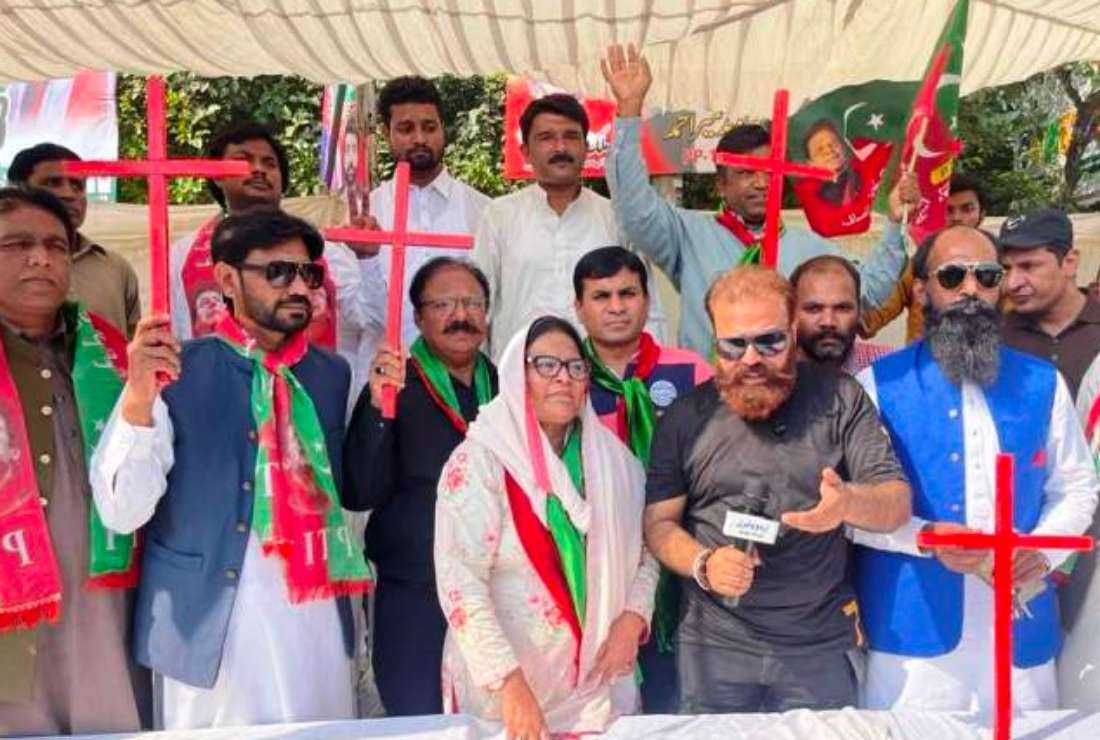
Pakistani politician Shunila Ruth and her band of supporters waved the cross as they welcomed Imran Khan, the ousted prime minister who recently launched a long march to the national capital in a bid to regain power.
“I admire the passion of Christians and other minorities for their captain. We are here to welcome and accompany him to Islamabad,” said the Christian member of the National Assembly while addressing the crowds in the eastern city of Gujranwala on Oct. 31.
The video clip of Ruth and her supporters evoked strong reactions on social media with many Christians criticizing her for disrespecting the cross.
Father Morris Jalal, founder and executive director of Lahore-based Catholic TV, called it “a misplaced show of Christian identity.”
He was clearly against mixing faith with politics and wanted politicians to avoid the use of a symbol of the Christian religion for political purposes.
“The cross contains in itself a mystery of salvation and is above politics. It should not become a tool to serve political interests,” he told UCA News.
However, Ruth, who wears two cross necklaces, calls it her shield, a symbol of protection against evil and danger.
“The cross is of great importance to our existence. We believe it will protect us in this jihad and war. My supporters and I also sang psalms and asked for help from God. It is wrong to misinterpret our stance,” she exclaimed.
Ruth pointed out that the Christian community displays the cross inside their homes and even on their vehicles.
“It is our witness in this country,” she told UCA News.
For decades, Church leaders in the Islamic Republic have wanted a ban on this controversial practice.
But despite all the criticism, the most visible symbol of Christianity continues to be a regular feature of political events, especially when organized by the minority wing of parties with a substantial Christian membership.
The cross, at times, is as ubiquitous as the political flag.
Hence, it was no surprise when crosses occupied vantage points at Lahore’s Liberty Roundabout on Oct 28, the day Khan’s Pakistan Tehreek-e-Insaf (PTI) party launched the ‘Haqeeqi Azadi March’ (Real Freedom March) to Islamabad.
Political observers say the former cricket star is focusing on young people, and to gain their support has been visiting colleges, especially those run by Christians.
His supporters had emblazoned the cross on banners at his meeting venues and the main crossroads of Lahore. Many were found lying abandoned on the roadsides the next day.
The cross has been politicized since the inception of Pakistan 75 years ago out of a bloody division of the subcontinent. Many migrants, not all of them Christians, wore it to save their lives during the partition riots.
Salik, a former federal minister for minorities, popularized the political use of the cross in the 1970s. A maverick, he is known to have indulged in bizarre stunts like tying himself to a cross or a giant cardboard dove, putting ash on his head, and even setting his household items on fire as a form of protest.
In 2003, he organized a rally of Christians displaying the cross at the UN office in Islamabad to demand an end to the war in Iraq.
The trend continues and Ruth and her PTI party are not the only guilty ones.
Christian lawmakers from the rival Pakistan Muslim League-Nawaz (PML-N) have done it on several occasions like the annual demonstrations to mark Kashmir Solidarity Day in Lahore or an anti-inflation protest last year.
There are four Christians presently serving as members of the Punjab provincial assembly. In the National Assembly too, there are four Christian parliamentarians, who include Ruth.
Azam Mairaj, a Christian activist-writer, blames all political parties for politicizing the cross.
“It is not good politics and hints at the identity crisis of our impoverished community,” he said.
He felt Christian politicians were showcasing the cross to merely serve their political goals and ambitions.
“Instead of gaining positions on merit and personal capacity, they strive for attention by displaying the cross. They should instead focus more on ensuring the progress of their community,” he said.
Christians in Pakistan have long complained of being sidelined in politics and society due to their minority religious status.
Christians make up a tiny portion of Pakistan’s overwhelmingly Muslim population of around 220 million. Estimates of their numbers vary. According to the country’s 2017 census, they total about 1.27 percent.
They remain grossly underrepresented in the country’s three-tier
governance system comprising national, provincial, and local
governments.
